In the world of rapidly evolving technology, the role of AI in commercial real estate is difficult to downplay. Artificial intelligence and solutions based on it are driving a transformative shift in the whole real estate industry, and CRE is no exclusion. Cutting-edge AI tools for commercial real estate help brokers, investors, property managers, and other real estate professionals redefine their practices and optimize tedious operations.
In our article, we explore AI solutions crafted for commercial real estate professionals, from text-generative chatbots to natural language listing search tools and advanced analytics. The article provides insights into commercial real estate capabilities, benefits, and real-world applications.
Top 5 AI tools for commercial real estate include:
- Write.Homes – CRE marketing and content creation;
- ValPal.ai – property descriptions generation;
- LeaseLens – AI lease abstraction service;
- Prophia.ai – commercial real estate portfolio management;
- Likely.ai – monitoring and predicting future opportunities for buying or selling properties.
Use Cases of AI in Commercial Real Estate
The integration of AI for commercial real estate has emerged as a game-changer, revolutionizing traditional practices and enhancing operational efficiency. Artificial intelligence and machine learning in commercial real estate are now used for text and image generation as well as analytics automatization.
Find examples of AI applications in commercial real estate which are helpful for all real estate professionals in the list below.
Natural language processing and machine learning in commercial real estate come together in AI Lease abstraction/Contract AI technology, which has a pivotal role in optimizing contract lifecycle management processes. This includes automating tasks like contract creation, analysis, document generation, approval, storing, and compliance analysis. AI in CRE streamlines the extraction of critical information from complex lease agreements and contracts. AI commercial real estate automation accelerates the abstraction process, saving time and reducing manual errors in data extraction.
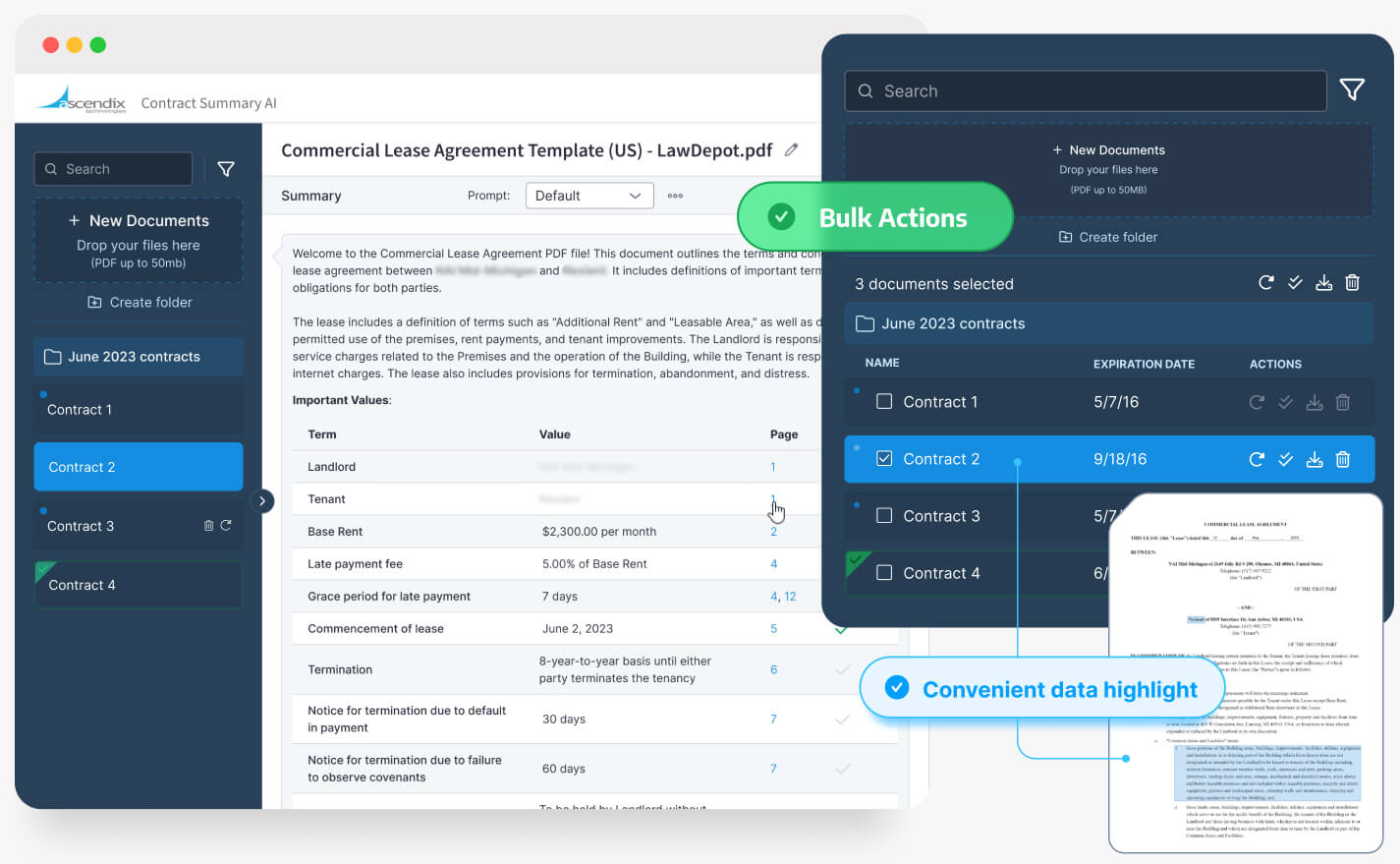
Contract Summary AI Interface
The Ascendix team has substantial expertise in commercial real estate and a deep understanding in this sphere, as we have developed our own lease abstraction software for summarizing documents according to the chosen criteria. The tool extracts key information like dates, numbers, and terms, and produces a summary of the uploaded document. Unlike ChatGPT, Ascendix lease abstraction software can handle documents of any length and may help you run compliance checks if required.
AI algorithms enhance natural language processing to optimize property search experiences. AI for marketplaces personalizes property listings search results based on user preferences, creating a more efficient and user-friendly marketplace and eliminating the need to scroll through thousands of properties while looking for a perfect one. Ascendix team has created AI property search chatbot for these purposes – you can find it in the section ‘Ascendix as an AI Expert.’
Text-generative AI in commercial real estate is often used in the form of chatbots. AI-powered chatbots facilitate real-time communication, providing immediate assistance and information to clients. With 24/7 customer support, personalized interactions, and automated responses to the most common questions or requests, chatbots contribute to improved customer satisfaction and engagement. Except for this, commercial real estate AI chatbots also let the brokers and agents free up some valuable time.
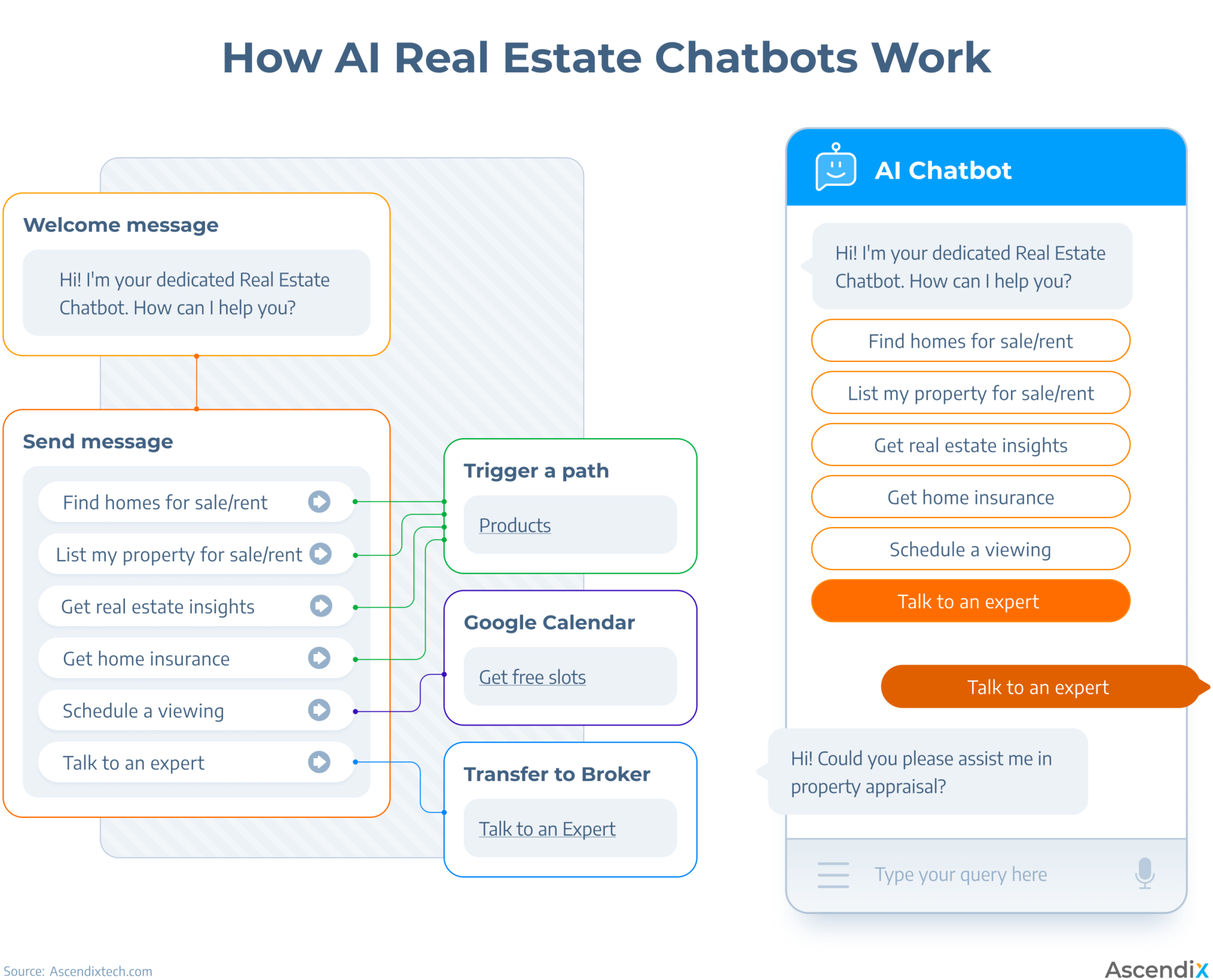
Commercial real estate AI algorithms analyze vast datasets to provide accurate and comprehensive property valuations based on property condition data, market trends, and other factors influencing correct property valuation. Predictive analytics enhance property valuation models by considering property condition, location, market trends and other factors influencing property prices.
Commercial real estate AI analyzes historical data to predict the market situation, identify potential risks and opportunities, and help to build a successful strategy. This allows brokers, agencies, and everybody involved in commercial real estate to make more informed decisions. AI applications in commercial real estate process vast amounts of historic financial data, including market trends, economic indicators, company performance metrics, and more. This allows AI in CRE to analyze and process the information, while simultaneously identifying prospective investing opportunities. Advanced algorithms of AI for commercial real estate can identify patterns and correlations that may not be apparent through traditional analysis.
AI recommendation systems operate thanks to predictive analytics, too. In addition to investment recommendations, CRE companies can leverage AI for property recommendations and tenant screening. These systems recommend properties to investors, tenants, or buyers based on their preferences, budgets, and requirements. At the same time, AI recommendation systems recommend tenants to landlords or property managers based on their creditworthiness, rental history, and other factors.
Sentiment Analysis
Sentiment analysis is also known as opinion mining or emotion AI. Sentiment AI for commercial real estate helps brokers, agents, and property managers to understand what people really think and feel. By learning
contextual representations of words and phrases, these models can accurately interpret the mood in text, capturing nuances, sarcasm, and cultural references.
CRE companies can find out their reputation in the eyes of potential tenants. Sentiment AI tools for commercial real estate can analyze online reviews, discussions, and other public feedback channels to help them become more trustworthy partners and more reliable employers. In the same way, sentiment analysis inspects every mention of your competitors online, revealing their weak sides so you can gain a competitive advantage. CRE companies can also use sentiment AI to analyze the property market in a specific city. If people complain about the lack of coworking spaces within a particular city area, that’s an excellent opportunity to fill this gap.
Also, tenant feedback and surveys reveal a negative sentiment towards the building’s amenities, prompting the company to invest in upgrades to retain current clients.
AI for Commercial Real Estate: Apps and Technologies
As AI continues to reshape industries, there appear more and more real estate companies ready to utilize it in their operations. However, the number of AI tools in commercial real estate can be overwhelming, leaving industry professionals grappling with the challenge of identifying the ones which are best suited for their specific business needs. In our extensive list further, we have collected and categorized some of the most useful AI tools for CRE.
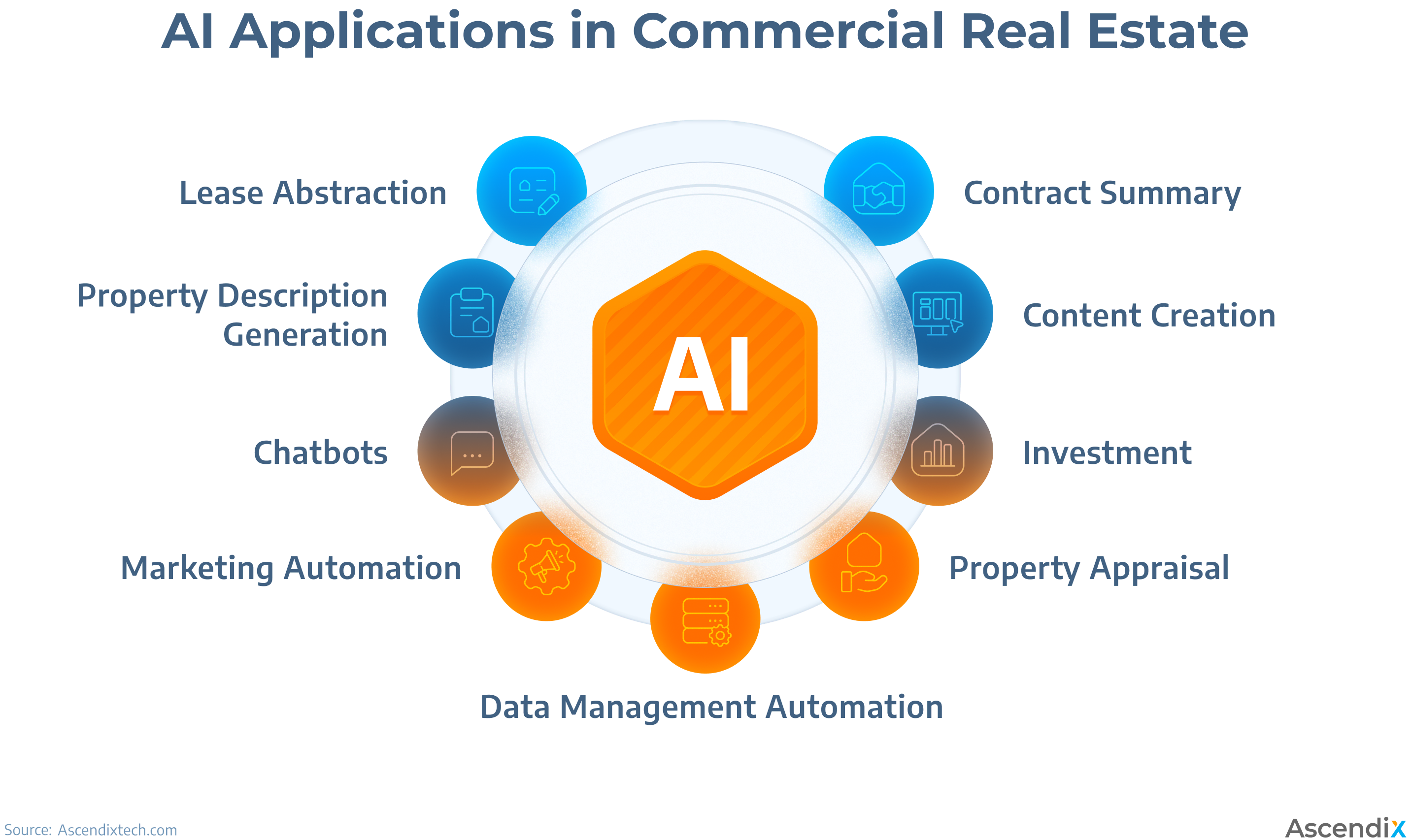
Use Cases | AI in Commercial Real Estate
Specialized AI Tools for Commercial Real Estate
Let’s start to discover AI in commercial real estate with an overview of dedicated purpose-built AI tools for commercial real estate. The specialized apps in this section offer a variety of solutions, from AI lease abstraction solutions to property management tools for CRE professionals. Discover this intersection of AI and commercial real estate, the blend of efficiency and innovation.
- Likely.AI. This AI monitoring technology identifies potential residential sellers, refreshes lost contact details, monitors events, new prospective property addresses and owners’ contacts, and sends automated alerts and notifications for lucrative opportunities.
- Prophia. Specializing in lease abstraction, this commercial real estate artificial intelligence platform offers data-driven insights for optimized investment strategies, increased leasing efficiency, reduced operational costs and elevating tenant satisfaction.
- LeaseLens. This commercial real estate AI tool is focused on lease abstraction services, offering cost-effective solutions for commercial real estate lease abstract exports. LeaseLens uses AI technology to extract relevant data points from lease contracts and generate lease abstracts, which helps agents to save time and get the important information quickly.
- EliseAI. This AI commercial real estate property management platform can automate tasks like leasing, resident conversations, service requests, and payments, integrating with various communication channels.
- DocSumo. An AI tool for commercial real estate is used for processing and digitizing rent rolls. The technology also includes pre-trained APIs specifically developed for CRE lenders’ needs and integrating all types of documentation a CRE broker may deal with.
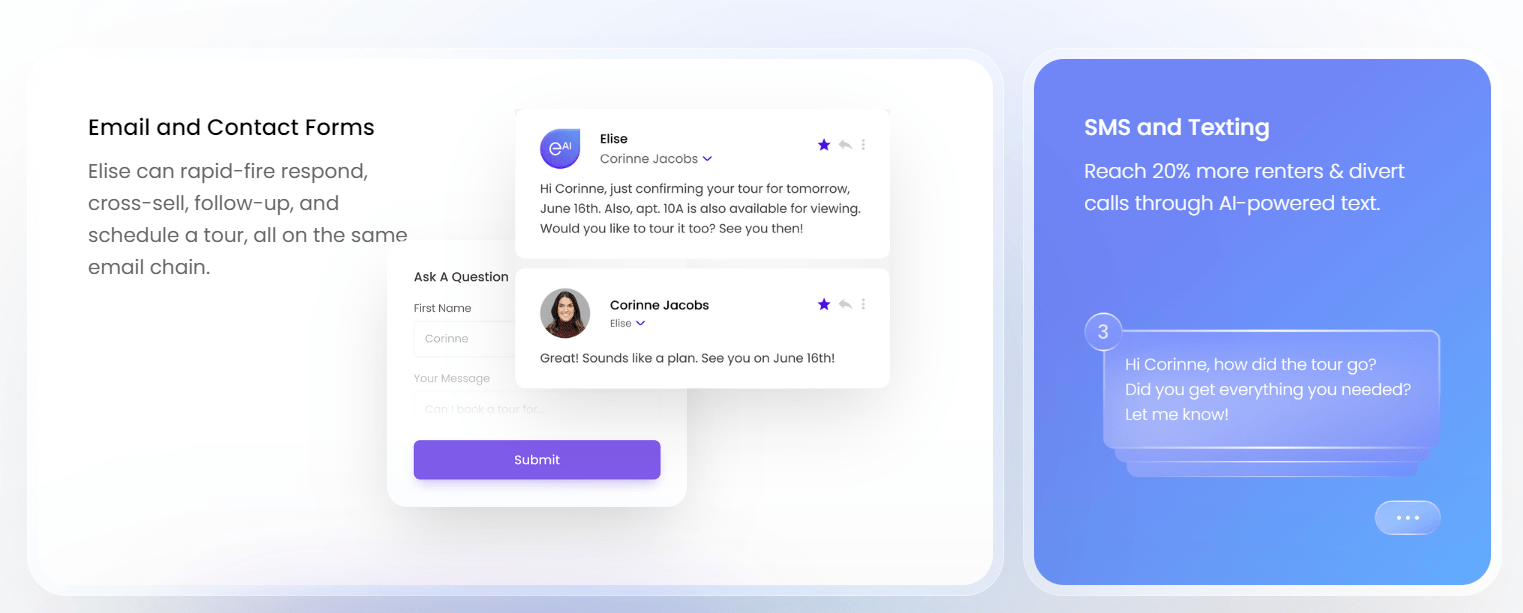
Interface of AI in CRE | Source: Elise.AI
AI for Commercial Real Estate: Contract Summary and Lease Abstraction Tools
AI in commercial real estate can easily solve the challenge of revisiting the same information multiple times and searching for data in lease contracts. Contract AI utilizes natural language processing and machine learning technologies, automating various stages of contract lifecycle management. The integration of AI in commercial real estate contract management means easier document generation, contract approval, document signing, and document storing.
- LeaseLens. This AI tool for commercial real estate specializes in lease abstraction services, offering efficient solutions for commercial real estate lease abstract exports.
- Prophia. An AI-powered asset/portfolio management platform with a focus on lease abstraction provides data-driven insights for optimized investment strategies and optimization of operations and commercial real estate workflows.
- DocSumo. DocSumo is a robust AI-driven tool designed for the fast and precise information extraction and processing of data from a wide range of real estate documents.
- Kira. This commercial real estate artificial intelligence software is useful for contract analysis and extraction of relevant information from contracts and lease documents. It also has capabilities for corporate teams across different business units to collaborate and get powerful insights from documents analyzed.
- Evisort. A contract management platform utilizes AI to analyze and extract key data points for efficient contract summaries. Except for summary creation, Evisort may use generative AI for drafting and negotiating contracts.
- LawGeex. Utilizing AI in commercial real estate not only for contract summary, LawGeex offers a contract review automation solution to scrutinize and amend legal documents according to set policies. Lawgeex comprehends the contractual context, makes amendments to the contract, and negotiates with the other party, just like a professional real estate broker or attorney.
- Ironclad. Ironclad provides a platform equipped with AI tools for commercial real estate to manage all facets of the contract lifecycle. Ironclad combines tools for document summary, drafting, editing, negotiation, search, storage, analytics, e-signature, and more in a single platform.
- LinkSquares. An AI-enhanced Contract Lifecycle Management platform that empowers teams to draft, summarize, edit, and review contracts, while managing the entire contract portfolio. LinkSquares proprietary AI is specifically designed for legal contract purposes, which simplifies the execution of team tasks.
- LegalSifter. Contract review tool leveraging AI to analyze and summarize contract terms and conditions for enhanced understanding. LegalSifter also provides guidance to customers to reduce the risks of signing suspicious contracts.
Build a Custom Real Estate Software with AscendixTech
Hire AscendixTech and we’ll execute your vision and create a thriving real estate software product or bootstrap your existing solution.
AI-Powered Chatbots for Real Estate
A real estate chatbot is used for handling inquiries related to buying, selling, and renting homes. Chatbots can answer questions about the real estate process, provide updates, collect contact details from leads, address property-related inquiries, and facilitate sales. AI chatbots as a part of commercial real estate software bring benefits, as the most manual and time-consuming part of work is automated and optimized.
- Rasa. One of implementations of AI in commercial real estate, this platform allows you to create and customize chats with the customers and train the chatbot to follow business policies and guidelines in customer support.
- Tidio. A chatbot that allows you to create customized customer journeys, analyze triggers and create responses based on the customer’s replies and actions.
- AgentBot by AIVO. This tool allows you to personalize the responses sent to customers, and automatically solve queries. The chatbot acts like a virtual assistant, simultaneously taking some workload of repetitive manual tasks off the employee’s shoulders.
- Chatbot.com. A platform allows you to create AI chatbots for customer support, lead generation, and more. The chatbots may be trained by multiple sources like your business website, help center or text documents and later updated as required.
- Hyro.AI. The chatbot works like a conversational AI assistant. It can optimize tasks like customer support, automating routine calls, and directing complex inquiries to appropriate departments.
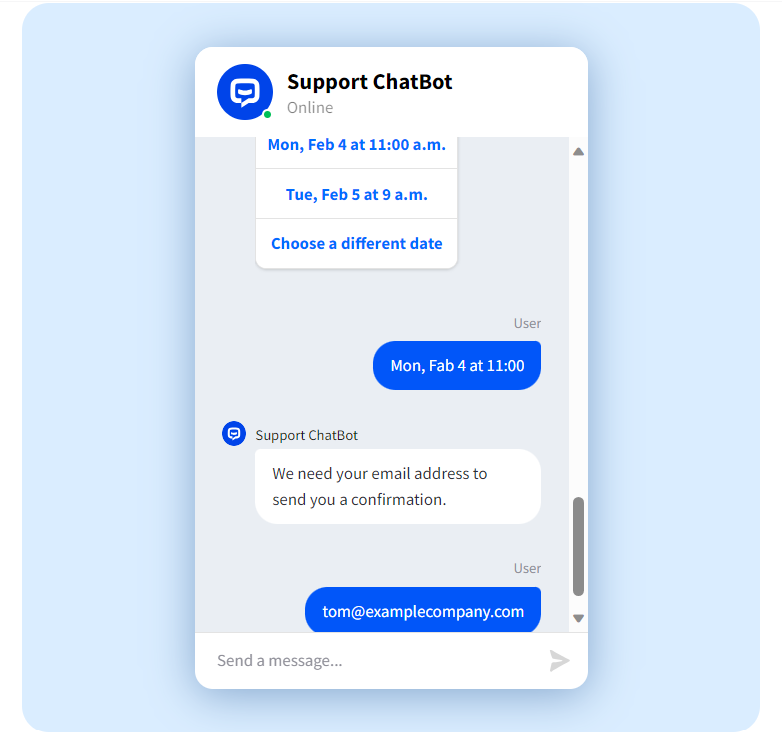
Example of chatbot for customer interactions | Source: Chatbot.com
Documents and Property Descriptions Generation
Document and property generation AI tools for commercial real estate are invaluable for time-efficiency. They streamline complex time-consuming processes of creating property listings, contracts, and other documents, allowing agents to focus on client interactions and deal negotiations. Moreover, AI in commercial real estate documents contributes to a professional image and appealing style of descriptions.
- ListingCopy.ai. The tool specializes in generating high-quality customer-oriented listing property descriptions, creating effective texts leading to increased listing response rates.
- LumiAI. This AI tool for commercial real estate is great for creating texts from scratch, be it property descriptions, summaries, or blog posts.
- ValPal.ai. The tool generates property descriptions based on the key elements of the property, inserted by the broker.
- ListAssist. Text generative AI for writing property summaries and descriptions based on property photos.
- Checkbox.ai. This app utilizes AI to streamline document drafting, editing, approvals, and e-signature processes, while simultaneously optimizing the document workflow.
- WordviceAI. This AI editor provides automatic error detection and correction features while drafting and editing documents.
- Handl. Handl is an extensive document platform powered by AI that converts documents into actionable data for various industries.
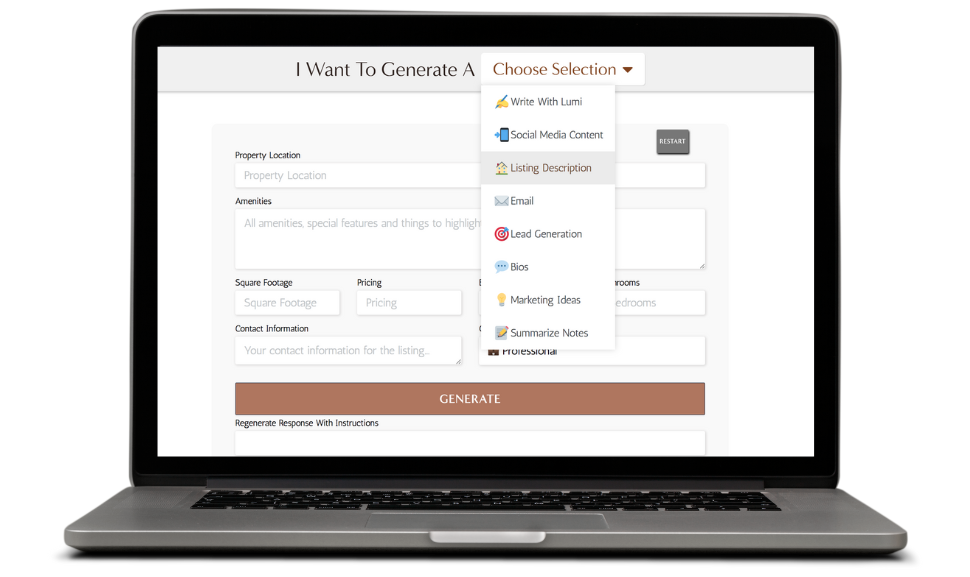
Text generative AI in CRE | Source: LUMI.AI
Marketing and Content Creation
Commercial real estate AI tools for marketing can be used for content creation, marketing automation, blog posts, and social media content creation. AI tools for commercial real estate analyze market trends and buyer behavior, tailoring marketing strategies for specific audiences. Moreover, they can enhance customer interactions on websites, providing instant responses and gathering leads information to enhance sales.
- Rechat.AI. An all-encompassing tool for generating marketing texts like blog posts, social media content, ads ideas, and even descriptions and texts audits.
- Write.Homes. It is an AI tool for content creation like blog posts texts, social media content, video scripts, and even handling customer objections.
- Saleswise. A comprehensive AI platform for generating marketing emails, sales scripts, interior visualizations, and website content.
- Phrasee. Phrasee is used to generate email, push, SMS, web, app, advertising content, and automate marketing activities.
- Jasper. Initially a marketing platform for creating brand-tailored content for business, Jasper also includes AI content creation capabilities, content improvement, advertising tools, and common integrations like Google suite.
Data Management and Automation AI Tools for Commercial Real Estate
AI in commercial real estate enables efficient data management from various documents such as reports, memorandums, due diligence documentation, and lease agreements. It facilitates timely updates and reporting, categorizes and stores documents, analyzes and summarizes market trends, and contributes to informed decision-making.
- Likely.AI. Likely.AI utilizes monitoring technology to identify potential sellers, refresh lost contact details, and send automated alerts, enhancing lead generation for commercial real estate businesses.
- Elise.AI. Elise.AI is an AI-driven property management platform automating leasing, resident interactions, service requests, and payments for improved efficiency.
- C3 AI. Property appraisal platform allowing real estate teams to make the valuation process quicker and less manual. C3 analyzes the data about the property, like its location and condition, and provides the approximate property value.
- Entera. A real estate investment platform, enhanced by AI, enables investors to find, buy, and operate properties on a big scale. Entera uses AI to identify promising investment opportunities and guides users through the entire investment process, from evaluation to transaction and closing.
- Productive.ai. Personal AI assistant that summarizes your calls, books calendar and appointments, and creates tasks.
- Alma by DealMachine. A virtual AI real estate investment assistant, Alma can give investing advice based on the inserted data, analyze properties for buying or renting, assess possible risks and profits, generate custom call scripts, and guide investors to maximum profitability.
- CompStak. AI-driven platform providing comprehensive property data, lease and sales comps, and enhanced real estate market analytics specifically for commercial real estate professionals.
- Quantarium. A diverse AI-powered analytics platform providing automated property valuation services and an extensive real estate Data Lake for valuable market insights.
Want to Integrate AI into Your Existing Solution?
See how AscendixTech can help you close more deals and improve your prospecting with the help of AI.
Why Build a Custom AI Search Chatbot?
AI can become a powerful tool for your business for enhancing customer satisfaction and optimizing workflows. One of possible applications of AI for commercial real estate is property search chatbot. It can be especially useful if your business deals with property marketplaces, listing portals, and similar listing services.
Some of the benefits of creating a custom AI property search chatbot just for your business include:
- Enhanced user experience. Instead of spending time wading through tons of filters, your customer would just type their query into a chatbot using conversational language and get a list of relevant properties that correspond to their needs and preferences.
- Flexibility. With traditional search, the customer can only use pre-set filters for property search. AI-powered chatbot allows the user to adjust and change the filters on the go, making the search more flexible and convenient.
- Quick information retrieval. With the AI search chatbot, users can instantly get information about listed properties, including details like pricing, amenities, reviews, and availability. This real-time access to property information helps potential buyers or tenants make the decision quickly, increasing the chances of sale or rent.
- Security. AI property chatbot has end-to-end encryption for communication between users and the software. Any sensitive information, such as personal details and property information, is secure during search, meaning a safe environment for users to share their preferences and for business to provide highly detailed property descriptions.
- Seamless integration with existing systems. A chatbot integrates with the real estate listings database, ensuring that the information presented to users is always up-to-date. This streamlines the property search process and prevents discrepancies in data
Ascendix has the capabilities to individually integrate the natural language search chatbot into listing portals, which eases and speeds up the process of finding relevant property options on marketplaces like Zillow or Airbnb. Implementing best practices of AI in our software solutions, we have expertise in using it for various purposes in real estate. Experienced Ascendix AI team can develop and tailor the property search chatbot to the needs of your business, streamlining search, optimizing customer experience, and boosting sales.
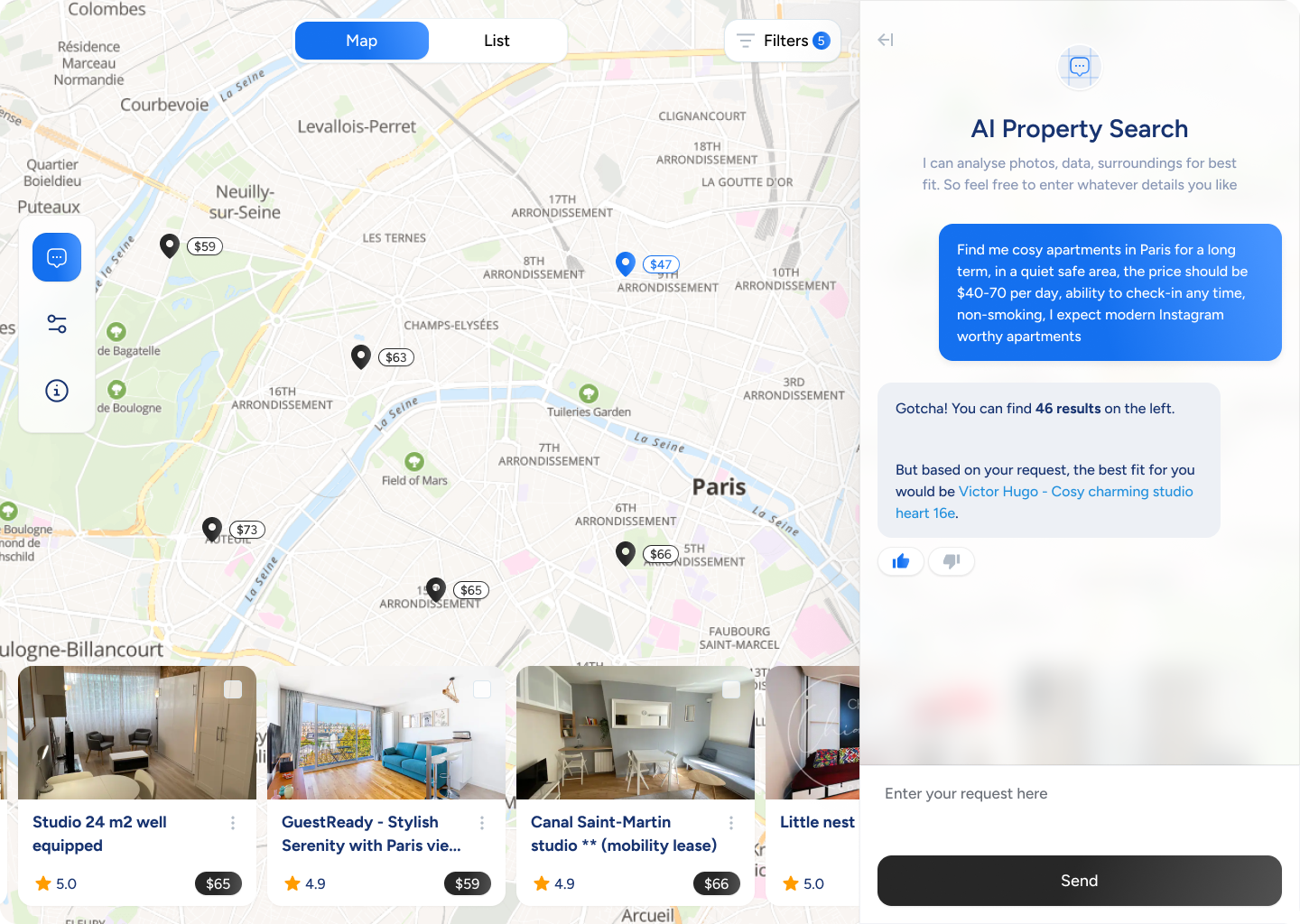
Interface of Ascendix AI Property Search Chatbot
Ascendix as an Expert in AI for Commercial Real Estate
Ascendix, a pioneer in real estate technology, boasts unique expertise in advancing the industry through innovative solutions. With our immense practical experience in real estate and proptech as well as implementing AI technologies in software solutions, we drive transformative change into the real estate industry and create innovation.
Why Choose Ascendix?
- Extensive AI Expertise. Ascendix excels in creating AI tools for lease abstraction, contract summary, property description generation, property matching, and recommendations, AI natural language property search for listings, and chatbots for optimizing and streamlining real estate work processes.
- Significant Real Estate Experience. Ascendix has over two decades of experience delivering tailored real estate solutions for both large enterprises and startups. Our proven track record of high-quality service in the real estate technology domain includes development of tailored solutions.
- Collaboration with Industry Leaders. Trusted by major real estate players like JLL and Colliers for developing in-house solutions. A portfolio of over 300 clients worldwide, showcasing diverse experience and adaptability.
- International Presence. Global outreach with five offices around the world enables diverse skill sets and continuous connectivity for Ascendix clients. As we are engaged in both European outsourcing and collaboration with the US market, Ascendix has invaluable insights into international trends and demands.
How Ascendix Can Implement AI in Commercial Real Estate
- AI Integration into New and Existing Software. With substantial Ascendix expertise in AI-powered technology, we can integrate AI into your existing or custom software solutions, optimizing features and tailoring the AI tools to your unique commercial real estate business needs.
- AI Document Abstraction. We can integrate our AI intelligent document management framework into your existing software to simplify paperwork management.
- AI Consulting. We at Ascendix provide full assistance and consultancy in selecting the most suitable AI tools for commercial real estate which would be tailored to your business needs, whether it is AI property valuation, natural language search, or AI-driven chatbot.
- Technical Audit. If your commercial real estate AI is already up and running, but not as smoothly as you would like it to, we can conduct thorough evaluation and improvement of your existing system, giving recommendations about what could be improved and by what means.
- Custom AI Development. Ascendix team of top-end professionals can build a fully personalized commercial real estate AI software to meet your business specific requirements.
Entrust Your AI Project to AscendixTech
With expertise in real estate and technology, we deliver AI software, tailored to your business needs.
How to use AI in commercial real estate?
AI in commercial real estate can be used for automating lease abstraction, predicting and analyzing market trends, personalizing customer interactions through chatbots, generating marketing content, optimizing property management and maintenance, enhancing tenant experiences, and optimizing property portfolios. These applications streamline operations, improve efficiency, and empower commercial real estate professionals to keep ahead of the game in the competitive real estate landscape.
AI applications in commercial real estate
AI can have various applications in commercial real estate, some of the most common cases include lease abstraction and contract summary, AI-powered chatbots for customer support and listing search, AI property valuation tools, AI for real estate investment and marketing trends analysis, text generating AI for creating content and property descriptions, and tools for marketing and analytics automation. By using these commercial real estate AI instruments, manual work in real estate can be automated and, therefore, will be completed faster and at a higher quality.
Yana Yarotska
Yana is a proptech enthusiast and a technology fan. In her articles, she explores the world of real estate software, including proptech news, useful resources, and real estate technology insights, assisting everyone involved in the industry to modernize and optimize their business.






